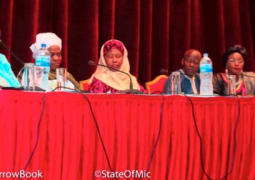John Charles Njie, former executive director of Pro Poor Advocacy Group (Pro-Pag), on 6 June 2012 continued his testimony before Magistrate Ngube of the Kanifing Magistrates’ Court.
He said he was paid social security contribution of 10 per cent by the defendant and 5 per cent was deducted from his salary to be paid to the SSHFC.
Mr Njie adduced that his last salary paid to him to D41,335.30 as the last salary he received in May 2007.
At that juncture, he was shown some pay slips by his lawyer, Mrs Mendy, who applied to tender them.
The defence counsel did not raise any objection, and the documents were admitted by the tribunal as exhibits.
The plaintiff further told the tribunal his May salary was D30,000 because he had a loan with the defendant, adding that they had a procedure manual which was tendered by his lawyer and the defence counsel did not object to the tendering of the said document.
He was still in the employment of the defendant, he said, adding that in August 2011, he was asked to stay away from the office by the director, Omar Jobe, until further clarification was sought about him.
He testified that on 10 May 2011, he received a fax addressed to him as director from the permanent secretary of the Ministry of Finance and Economic Affairs, and the fax tendered by his lawyer was admitted by the tribunal after the defendant’s counsel said she had no objection.
Still testifying, the plaintiff further stated that the said fax indicated that Adelaide Sosseh was not recognised by The Gambia government as chairperson of the Board of Directors.
He posited that the fax also indicated that a new chairperson would be identified and the plaintiff should be replaced by Omar Jobe, who is now director.
He narrated that the Board of Directors met and at the meeting and agreed that a letter dated 17 May 2009 be sent.
The said letter was also tendered by the plaintiff’s counsel, to which the defendant’s counsel made no objection.
The tribunal admitted the document.
He testified that the post of a chairperson of the Board of Directors was elective for a fixed term by the General Assembly.
He said the board did not agree for him to be replaced by Omar Jobe because the directives indicated in a fax letter sent to the plaintiff were untenable, adding that the board did not adhere to the directives.
He told the tribunal that after the meeting by the board, they held an AGM and an interim board was chosen because the entire board resigned.
He also said an interim board was established, the executive came and decided to follow the directives and was asked to hand over to Omar Jobe in the presence of the interim board.
The handing-over document was tendered at this juncture by the plaintiff’s counsel, with no objection from the defendant’s counsel, before the tribunal admitted the said document.
Mrs Mendy, the plaintiff’s counsel, informed the tribunal she had another matter at the High Court and applied for an adjournment.
Subsequently, the case was adjourned till 27 June 2012.
Read Other Articles In Article (Archive)



